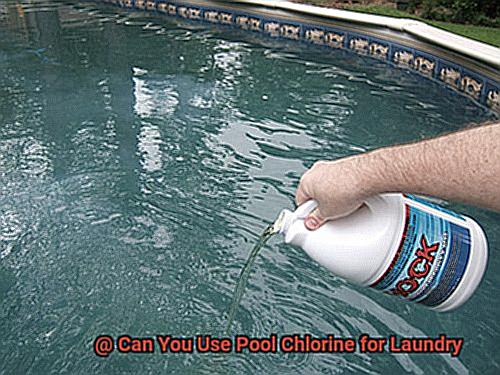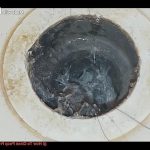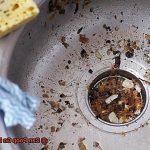Imagine this: you’re basking in the sun by the pool, the scent of chlorine wafting through the air. You can’t help but wonder if that same powerful disinfectant could be used for other purposes – like cleaning your laundry. It might sound crazy, but some people have been experimenting with using pool chlorine as a laundry detergent alternative.
Before you start pouring buckets of chlorine into your washing machine, there are a few things you should consider. In this blog post, we’ll explore whether or not it’s safe and effective to use pool chlorine for laundry. We’ll also discuss alternative laundry solutions that might work better for your needs.
Chlorine is a potent disinfectant that kills bacteria and viruses, making it an appealing option for those who want to go the extra mile in cleaning their clothes or cut down on laundry costs. However, using pool chlorine for laundry comes with potential risks and drawbacks that you need to be aware of.
So, if you’re curious about this laundry hack or just want to learn more about the science behind chlorine and its effects on fabrics, keep reading. We’ve got all the information you need to make an informed decision about using pool chlorine for your next load of laundry.
Contents
What is Pool Chlorine?
Pool chlorine, also known as sodium hypochlorite, is a powerful chemical used to sanitize swimming pools and hot tubs. It’s an essential component of pool maintenance as it helps to kill bacteria, viruses, and other microorganisms that can thrive in pool water.
Chlorine comes in different forms including granules, tablets, and liquid bleach. The most common form of pool chlorine is liquid bleach which contains 10-12% sodium hypochlorite. Once added to the pool water, it reacts with water to produce hypochlorous acid (HOCl) and hypochlorite ion (OCl-). These compounds attack the cell walls and enzymes of microorganisms, breaking them down and rendering them harmless.
But that’s not all. Chlorine also helps to oxidize organic matter like sweat, urine, and other body fluids that can cause unpleasant odors and cloudiness in pool water. At the same time, it keeps your pool looking crystal clear and inviting.
It’s important to note that while pool chlorine is effective for sanitizing swimming pools, it should never be used for laundry. The concentration of chlorine in pool water is much higher than what is needed for laundry use, which can damage fabrics and cause discoloration.
Additionally, pool chlorine may contain other additives such as stabilizers and algaecides that are not suitable for laundry use. For safe and effective laundry disinfection, it’s best to use a laundry detergent that contains bleach or a separate bleach product designed for laundry use.
When handling pool chlorine, always follow the instructions carefully to ensure proper usage. Exposure to pool chlorine can cause skin irritation, eye irritation, and respiratory problems if it comes into contact with skin or is inhaled. Always keep it away from clothing and fabrics.
Why Should You Not Use Pool Chlorine for Laundry?
Before you reach for that bottle of pool chlorine, hold on. Using pool chlorine for laundry may seem like a simple solution, but it can cause more harm than good.
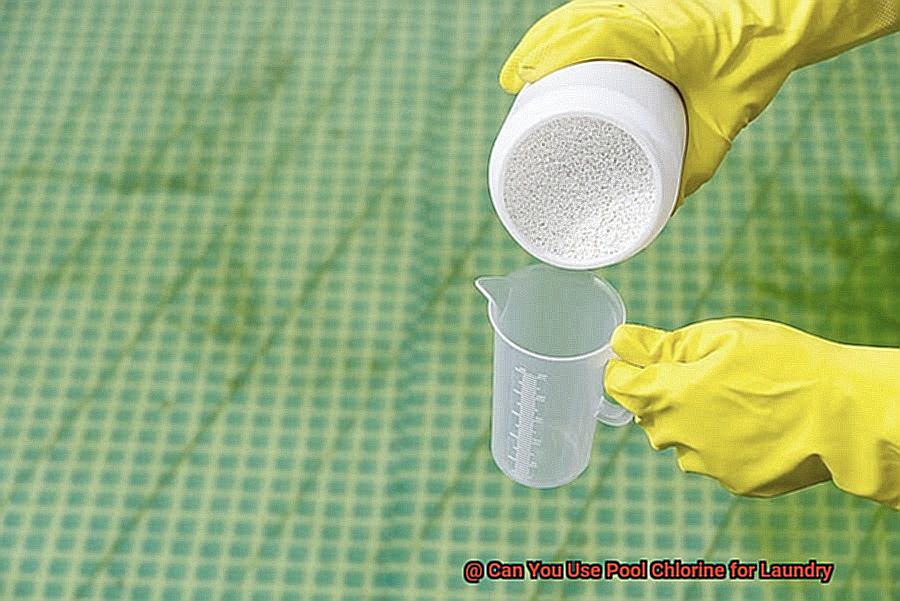
First and foremost, pool chlorine is not formulated for use on fabric, and it can cause significant damage to clothing. The chlorine in bleach is known to weaken the fibers of clothes, causing them to become thin and brittle over time, which can lead to holes and tears. Your favorite shirt or dress could be ruined forever with just one use of this product.
Furthermore, pool chlorine contains a higher concentration of sodium hypochlorite than regular household bleach. This high concentration can cause skin irritation, respiratory problems, and eye damage when used improperly. When using pool chlorine for laundry, the fumes can be harmful, especially in poorly ventilated areas. It’s not worth risking your health just to get rid of a stain.
But that’s not all. Pool chlorine can create yellow stains on clothing that are nearly impossible to remove. These stains are often permanent and can ruin clothes entirely. Additionally, pool chlorine can alter the color of fabric, causing it to fade or change color entirely. Your once vibrant clothes could become dull and lifeless after just one wash.
Lastly, pool chlorine is not designed for use in washing machines. The high concentration of sodium hypochlorite can damage the machine’s internal components over time. This damage can lead to costly repairs or even the need to replace the washing machine entirely. It’s not worth risking your appliance just to save a few dollars on laundry detergent.
Potential Damage Caused by Pool Chlorine in Laundry
However, it’s important to be aware of the potential damage that can occur if it’s not used properly. While pool chlorine is great for keeping your pool free from harmful bacteria, it can cause significant harm to your clothing.
The main issue with using pool chlorine on your laundry is that it can lead to discoloration, fading, and even holes in your clothes. This is because chlorine is a powerful disinfectant that can break down the fibers in your clothing if it’s not diluted correctly. Over time, chlorine can also weaken the fabric, causing tears and rips.
Another concern when using pool chlorine in laundry is that it can react with other chemicals in your laundry detergent or water, creating harmful fumes that can be dangerous to inhale. It’s essential to note that chlorine bleach and pool chlorine are not the same; chlorine bleach is formulated explicitly for laundry use and is designed to prevent damage to fabrics.
So, what’s the solution if you need to bleach your clothes? Stick to using laundry-specific products that are specially designed to work with your fabrics. If you must use chlorine bleach, follow the instructions carefully and dilute it correctly before use. Avoid mixing chlorine bleach with other cleaning products or chemicals as this can create harmful reactions.
Health Risks of Using Pool Chlorine for Laundry
Think twice. While it may seem like a quick and easy solution to clean your clothes, using pool chlorine can pose serious health risks.
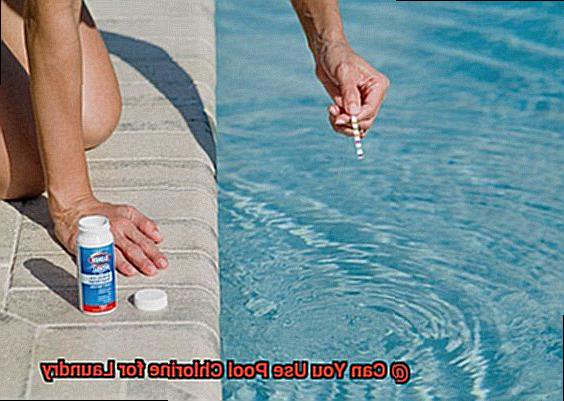
One of the most significant concerns with using pool chlorine for laundry is the risk of skin irritation and allergies. This potent chemical can cause redness, itching, and even rashes, particularly for those with sensitive skin or existing skin conditions. Even worse, exposure to chlorine can also lead to respiratory problems such as coughing and wheezing – especially hazardous for those with asthma or other respiratory conditions.
Chlorine doesn’t stop at causing skin and respiratory issues. It also poses a risk to your eyes. As an oxidizing agent, chlorine can break down proteins in the eyes, causing redness, stinging, and even temporary vision loss in severe cases. And if that wasn’t enough, there’s also a chance of accidental ingestion of chlorine when using it for laundry. This can happen if the chlorine isn’t rinsed out of clothes properly or if someone accidentally ingests laundry detergent containing chlorine. Ingestion of chlorine can cause nausea, vomiting, and stomach pain.
Overall, the health risks associated with using pool chlorine for laundry far outweigh any potential benefits. It’s crucial to use alternative laundry detergents that do not contain chlorine or handle chlorine carefully and according to manufacturer instructions if using it for laundry purposes.
Alternatives to Pool Chlorine for Laundry
Look no further. There are several amazing alternatives that not only work wonders on your clothes but also protect your health and the environment.
One alternative is hydrogen peroxide. This natural and non-toxic bleach alternative can brighten whites and remove stains, making it the perfect solution for tough laundry jobs. You can also use it as a pre-treatment for stubborn stains. All you have to do is add a cup of hydrogen peroxide to your laundry load, sit back, and let it work its magic.
Another fantastic option is vinegar. It helps to soften clothes, remove bad odors, and even acts as a natural fabric softener. Vinegar can also be used as a pre-treatment for stains, and it helps prevent colors from fading. Simply add half a cup of vinegar to your laundry load and watch it work wonders.
Baking soda is another great alternative that can brighten whites and remove stains. It’s also perfect for neutralizing odors and softening clothes. Add half a cup of baking soda to your laundry load, and you’ll notice the difference in no time.
Lastly, eco-friendly laundry detergents are an excellent alternative to pool chlorine. These detergents are designed specifically to be gentle on clothes and the environment. They use natural ingredients like plant-based surfactants and enzymes to clean clothes effectively without harsh chemicals.
How to Safely Handle and Store Pool Chlorine
Having a swimming pool can be a great way to enjoy the summer months, but it comes with responsibilities. One of the most important is to ensure that the pool is properly maintained, and this includes safely handling and storing pool chlorine. Chlorine is a powerful chemical that can cause harm if not handled properly, so it’s essential to take precautions to keep you and your family safe.
The Importance of Proper Handling
Chlorine can be hazardous if not handled correctly, and this is why protective gear such as gloves and goggles are necessary. It’s also vital not to mix chlorine with other chemicals or water, as this can cause a chemical reaction that releases toxic gases. Always follow the manufacturer’s instructions carefully when handling chlorine.
The Significance of Proper Storage
Storing pool chlorine safely is crucial to prevent accidents and injuries. Chlorine should be kept in a cool, dry, and well-ventilated area away from other chemicals and flammable materials. It’s important to store chlorine in its original container with the lid tightly sealed to prevent any leaks or spills.
Transporting Chlorine Safely
Transporting pool chlorine should be done in a separate container specifically designed for hazardous materials. This will ensure that the chlorine is contained during transport and won’t leak or spill. Always keep the container out of reach of children and pets, and handle it carefully to avoid any accidents.
The Dangers of Using Pool Chlorine on Clothing
Pool chlorine should never be used on clothing as it can cause yellowing of whites, fading of colors, and even bleach spots on fabrics. Additionally, pool chlorine contains other chemicals that can cause discoloration or damage to clothing fibers. Stick to using bleach designed for laundry and follow the instructions carefully.
Keeping Your Family Safe
By following these safety guidelines for handling and storing pool chlorine, you can keep your family safe from harm. Always wear protective gear when handling chlorine, store it properly in a cool and dry place, and transport it safely. By being aware of the potential risks and taking proper precautions, you can enjoy a clean and safe swimming pool without putting your family at risk.
JDdWwbGXV5o” >
Conclusion
In conclusion, while pool chlorine may seem like a quick fix for your laundry woes, it’s not worth the potential damage to your clothing and health. Using products specifically designed for laundry purposes is crucial to ensure the longevity of your clothes and the safety of your health and appliances.
Sure, pool chlorine is a powerful disinfectant that can kill bacteria and viruses, but it can also cause discoloration, fading, and even holes in your clothes. Plus, its high concentration of sodium hypochlorite can lead to skin irritation, respiratory problems, and eye damage if used improperly. Yikes.
Thankfully, there are plenty of other options available that won’t put your clothes or health at risk. Hydrogen peroxide, vinegar, baking soda, and eco-friendly laundry detergents are all fantastic alternatives that work wonders on your clothes while being gentle on you and the environment.
When it comes to handling pool chlorine safely, there are a few things to keep in mind. Always wear protective gear when handling it and store it properly in a cool and dry place away from children and pets. And remember to follow instructions carefully when dealing with any chemicals – safety first.
In summary: skip the pool chlorine for laundry day. Stick with tried-and-true laundry products or eco-friendly alternatives instead.

